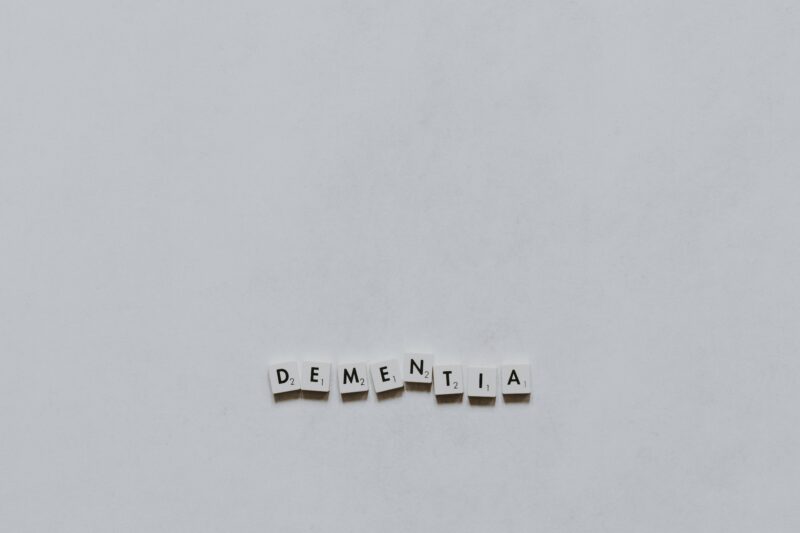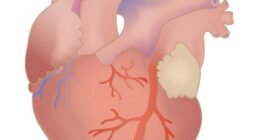Dementia is an overall term for symptoms that impact memory, the performance of daily activities, and communication abilities. Alzheimer’s disease is the most common type of dementia.
What is Dementia?
(Photo by Danie Franco on Unsplash )

Dementia is not a specific disease. It’s a broad term that describes a group of symptoms associated with a decline in the ability to think and remember. Dementia affects people of all ages but is most common in older adults. It’s estimated that more than 5 million Americans have Alzheimer’s disease, the most common type of dementia.
Dementia symptoms can differ depending on the underlying cause. But in general, they may include:
- Memory loss
- Difficulty communicating
- Difficulty with basic day-to-day tasks
- Confusion
As dementia progresses, symptoms may become more severe. People with dementia may eventually need help with all aspects of their daily life.
What are the types of Dementia?
There are many types of Dementia, each with its own symptoms and causes. The most common types are Alzheimer’s Disease, Lewy Body Dementia, Vascular Dementia, and Frontotemporal Dementia.
Alzheimer’s Disease is the most well-known form of Dementia. It is characterized by memory loss, difficulty with language, and impaired judgment. Lewy Body Dementia is similar to Alzheimer’s Disease but includes hallucinations and movement problems. Vascular Dementia occurs when there is damage to the brain’s blood vessels and is characterized by problems with executive functioning and visuospatial abilities.
Here is a list of the types of Dementia
Dementia is a broad term that describes a decline in cognitive function and memory that affects a person’s ability to perform daily activities. The following are the most common types of dementia:
- Alzheimer’s disease: This is the most common form of dementia, accounting for 60 to 80 percent of all cases. It is characterized by memory loss, difficulty with language, disorientation, mood swings, and changes in behavior.
- Creutzfeldt-Jakob disease: This is a rare form of dementia that occurs as a result of abnormal proteins in the brain. It is characterized by rapidly progressive symptoms including muscle weakness, twitching, and memory loss.
- Lewy body dementia: This form of dementia is characterized by memory loss, difficulty with movement and coordination, visual hallucinations, and changes in alertness and attention.
- Frontotemporal dementia: This type of dementia affects the frontal and temporal lobes of the brain, leading to changes in behavior, language, and judgment.
- Parkinson’s disease dementia: This type of dementia occurs in people with Parkinson’s disease, a progressive disorder of the nervous system that affects movement.
- Mixed dementia: This term is used to describe the presence of more than one type of dementia in a person, often Alzheimer’s disease and vascular dementia.
- Vascular dementia: This type of dementia occurs after a stroke or a series of strokes, leading to a decline in cognitive function.
What are the symptoms of Dementia?
Dementia symptoms can vary greatly from person to person. One of the most difficult things about dealing with it is that the symptoms can be very hard to spot in the early stages. This is because they develop gradually and can be easily confused with other age-related changes. However, there are some key symptoms that you should be aware of.
the most common being memory loss. This can include forgetting recent events, struggling to remember familiar faces or places, and having difficulty retaining new information.
Another common symptom is a change in mood or behavior. This can manifest itself as irritability, anxiety, apathy, or depression. You may also notice that a person with dementia is more withdrawn and socially isolated. Some people with dementia have only mild symptoms while others have more severe symptoms that impact their ability to function independently
Symptoms of Dementia
The symptoms of dementia can vary depending on the type of dementia and the individual, but some common symptoms include:
- Memory loss: This can include difficulty remembering recent events, names, and faces.
- Difficulty with communication: People with dementia may have trouble finding the right words or understanding what others are saying.
- Impaired judgment and reasoning: Dementia can affect a person’s ability to make decisions, plan, and solve problems.
- Disorientation: People with dementia may become confused about time, place, and people.
- Changes in mood and behavior: Dementia can cause mood swings, depression, anxiety, and changes in personality.
- Visual problems: Some forms of dementia can cause visual hallucinations and difficulty interpreting visual information.
- Difficulty with daily activities: People with dementia may have trouble completing familiar tasks, such as cooking a meal or using household appliances.
- Motor symptoms: People with dementia may experience tremors, stiffness, and difficulty with coordination and balance.
It is important to note that not all people with dementia will experience all of these symptoms, and the symptoms may progress at different rates for different individuals. If you or someone you know is experiencing symptoms of dementia, it is important to see a doctor for a proper diagnosis and treatment plan.
Causes of dementia
There are many causes of dementia, with the most common being Alzheimer’s disease. Other causes include Lewy body dementia, frontotemporal dementia, and vascular dementia.
Alzheimer’s disease is the most common form of dementia, accounting for 60-80% of all cases. It is a degenerative neurological condition that results in the death of brain cells and the deterioration of cognitive function. Symptoms include memory loss, confusion, difficulty communicating, and impaired judgment.
Lewy body dementia is the second most common form of dementia, accounting for 10-20% of all cases. It is a progressive neurodegenerative disorder that affects cognition and movement. Symptoms include hallucinations, delusions, and Parkinson’s-like symptoms such as rigidity and tremor.
Frontotemporal dementia accounts for 5-10% of all cases of dementia. It is a group of disorders that affect the frontal and temporal lobes of the brain. The symptoms vary depending on which part of the brain is affected but can include changes in personality and behavior, difficulty speaking, and problems with vision.
Vascular dementia accounts for 10-20% of all cases of dementia. It is caused by damage to the blood vessels supplying the brain. This can lead to strokes or mini-strokes (known as transient ischemic attacks or TIAs), which can in turn cause problems with cognition and thinking skills. Symptoms can include memory loss, difficulties with
Risk factors for alzheimer’s disease
There are many risk factors for Alzheimer’s disease, including age, family history, and lifestyle choices. The most significant risk factor is age – Alzheimer’s disease primarily affects older adults. The risk of developing Alzheimer’s increases with age, and the majority of people with the disease are 65 years or older. Family history is also a risk factor – if you have a parent or grandparent with Alzheimer’s, your risk of developing the disease is increased. Finally, lifestyle choices such as smoking, obesity, and lack of exercise can also increase your risk of Alzheimer’s disease.
What is Alzheimer’s?
(Photo by Tim Doerfler on Unsplash )

Alzheimer’s is a type of dementia that causes problems with memory, thinking, and behavior. Symptoms usually develop slowly and get worse over time, becoming severe enough to interfere with daily tasks.
Although Alzheimer’s cannot be cured, treatments are available to help manage the symptoms. Early diagnosis is important so that people with Alzheimer’s can get the treatment and support they need.
What are the symptoms of Alzheimer’s?
There are many symptoms of Alzheimer’s Disease, but the most common are memory loss, problems with communication, and changes in mood and behavior. If you or a loved one is experiencing any of these symptoms, it’s important to see a doctor. Early diagnosis and treatment can help slow the progression of the disease. however, There is no one test that can diagnose Alzheimer’s
Dementia Vs. Alzheimer – How they differ?
Dementia is a broad term used to describe a decline in cognitive function and memory that affects a person’s ability to perform daily activities. Alzheimer’s disease is the most common type of dementia, accounting for 60 to 80 percent of all cases. While Alzheimer’s is a form of dementia, not all dementia is Alzheimer’s.
The most significant difference between dementia and Alzheimer’s disease is that dementia is a broad term that describes a decline in cognitive function and memory, while Alzheimer’s is a specific type of dementia that is caused by specific brain changes.
Alzheimer’s disease is characterized by the gradual death of brain cells and the development of protein deposits called amyloid plaques and neurofibrillary tangles. These changes in the brain lead to symptoms such as memory loss, difficulty communicating, disorientation, and changes in mood and behavior.
Other forms of dementia, such as vascular dementia and Lewy body dementia, have different causes and may produce different symptoms. For example, vascular dementia can occur after a stroke or series of strokes, and is characterized by problems with memory, language, and coordination. Lewy body dementia, on the other hand, is characterized by visual hallucinations and fluctuations in alertness and attention.
Alzheimer’s is a type of dementia, not all forms of dementia are Alzheimer’s. It is important to get a proper diagnosis from a doctor to determine the type and cause of dementia, as different types of dementia may require different treatments.
In summery
- Dementia is an umbrella term used to describe a decline in mental ability due to disease or injury. Alzheimer’s disease is the most common form of dementia, accounting for 60-80% of all cases.
- Dementia affects people of all ages, but Alzheimer’s disease typically affects those over 65.
- Dementia can lead to a decline in cognitive abilities, such as memory and problem-solving. Alzheimer’s disease specifically causes problems with short-term memory, language, and visuospatial skills.
- Dementia can be reversible if the underlying cause is treated. Alzheimer’s disease is progressive and currently has no cure.
- The progression of dementia can vary greatly from person to person, while the progression of Alzheimer’s disease is more predictable.
Treatments for dementia and alzheimer’s disease
There is no one-size-fits-all answer to this question, as the best course of treatment for dementia and Alzheimer’s disease will vary depending on the individual’s specific situation and needs. However, there are some general treatments that can be effective for both conditions.
One common treatment approach is to focus on managing the symptoms of the condition. This can involve medication to help with things like memory loss, confusion, and difficulty communicating. There may also be non-drug therapies that can be helpful, such as reminiscence therapy (which involves talking about past experiences and memories) or cognitive stimulation therapy (which helps to engage the mind and improve thinking skills).
Another important part of treatment is supporting caregivers. This can include providing education about the condition, giving practical tips for caring for someone with dementia or Alzheimer’s disease, and offering emotional support. There may also be respite care services available, which can give caregivers a much-needed break from their caregiving duties.
Does all dementia turn into Alzheimer’s?
No, not all cases of dementia will progress to Alzheimer’s disease. While Alzheimer’s disease is the most common form of dementia, there are other types of dementia that can lead to different symptoms and treatment options.
How long can you live with alzheimers?
According to the Alzheimer’s Association, the majority of people with Alzheimer’s disease live between four and eight years after their diagnosis. However, some people may live as long as 20 years with the disease.
Can you have dementia without having Alzheimer’s?
It is possible to have dementia without having Alzheimer’s disease. Dementia is an umbrella term used to describe a decline in cognitive function, while Alzheimer’s disease is the most common cause of dementia. Other causes of dementia can include Lewy body disease, frontotemporal lobar degeneration, and vascular dementia.
Can dementia be cured?
Dementia is a general term for a decline in mental ability due to disease or injury. Alzheimer’s disease is the most common type of dementia.
Dementia is not a specific disease. It’s an overall term that describes a group of symptoms associated with a decline in brain function.
There are many types and causes of dementia, and currently, there is no cure. However, there are treatments available that can help manage the symptoms and slow the progression of the disease.
How to avoid dementia?
Dementia is a general term for a decline in mental ability due to disease or injury. Alzheimer’s disease is the most common type of dementia.
There are many things you can do to reduce your risk of developing dementia:
- Get regular exercise. Physical activity helps keep your brain and body healthy.
- Eat a healthy diet. A diet rich in fruits, vegetables, and whole grains can help protect your brain from damage.
- Don’t smoke. Smoking increases your risk of developing dementia and other health problems.
- Stay socially active. Connecting with others helps keep your mind sharp.
- Challenge your mind. Doing activities that challenge your mind, such as puzzles and crosswords, can help slow mental decline.
Featured Image by Pawel Czerwinski on Unsplash








